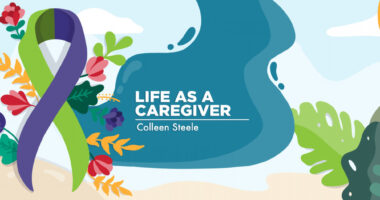Back to the Beginning of My Diagnosis: Part One

In late March 2015, I caught a nasty case of bronchitis. It was a doozy, and just seemed to linger. In fact, I seemed to be getting only worse even after three rounds of antibiotics, days spent drinking hot water and honey, and sleeping constantly. My lungs felt as if they were closing off. It felt as if my heart was making my chest too full. I was gasping for breath with every step. I kept going back to my doctor, who kept telling me the same thing; “You’re fine. It’s just a case of bronchitis we can’t seem to kick. Let’s try stronger antibiotics.”
But the days came where I would walk from my couch to the bathroom, and feel my heart pounding as if I had just ran miles and miles. I started passing out after walking across my small yard, and after attempting to walk up the 11 stair steps from my basement to the main floor. I was beyond exhausted, and failing miserably at my job as a nanny. I could barely take care of myself, so to try to take care of two small children was proving to be impossible.
I started going to the ER, to cardiologists. and to pulmonologists. I went to any doctor who would take the time to listen and try to help me. None of them succeeded. They would run all the tests — ECHOs, halter monitors, EKGs, blood work, a tilt-table test, CT scans, MRIs. Whatever was available, they would do, and the answer was always the same, doctor after doctor: “Your results are normal. You’re perfectly fine. It’s anxiety.”
“Anxiety.”
“Anxiety.”
“Panic attacks.”
“Anxiety.”
They all said it.
But I wasn’t fine. How could they say I was fine?! It didn’t make sense to me. I started to doubt myself. Is this just how people felt? Was I going crazy? Was I making this more dramatic than it needed to be?
It wasn’t until I saw my final cardiologist, and she once again told me my results were fine. Then she said the following, and it changed me. She said “This clearly isn’t a physical issue. This is a mental issue. You need to see a psychiatrist, and start working on your mental abnormalities. Because I can’t help you.”
I lost it. I started crying tears of frustration. I was yelling at her, telling her I KNEW something was very, very wrong. I knew it in my bones. I was NOT crazy. This was NOT a mental issue. I was yelling so much, that I got physically escorted from the building. I promptly fired that doctor, and vowed to keep going.
Finally, I asked my original doctor for a stress ECHO test. I had been thinking that most of the tests they had been doing were with me lying down, being still. He readily agreed. When I hopped on the treadmill to start walking I made it until six minutes before I passed out. After the ECHO was done and reviewed, I got a phone call. A nurse told me they found something. She said I needed to look up “Pulmonary Hypertension,” and come to my next doctor’s appointment with my questions. There it was. A sliver of an answer. It was right there at my fingertips.
Now, I had to realize what it all meant.
Next week: Part two of my diagnosis story.
***
Note: Pulmonary Hypertension News is strictly a news and information website about the disease. It does not provide medical advice, diagnosis, or treatment. This content is not intended to be a substitute for professional medical advice, diagnosis, or treatment. Always seek the advice of your physician or other qualified health provider with any questions you may have regarding a medical condition. Never disregard professional medical advice or delay in seeking it because of something you have read on this website. The opinions expressed in this column are not those of Pulmonary Hypertension News or its parent company, Bionews Services, and are intended to spark discussion about issues pertaining to pulmonary hypertension.








Ella macleod
Boy does this sound so familiar. It started in july 2015 by the end of September I was having tingles in my hands after any exertion and seeing stars. My Dr sent me for an ekg and by noon that day he had called and told me the bottom part of my heart wasn't pumping right. If I was to have systoms of a heart attack to go to the hospital that specializes in heart problems in our area. October 31 my 7 year old had to call 911. Within 2 hours the er doctor suspected pah. After 2 weeks in the hospital we had a diagnosis of ipah. My red blood cell count was through the roof from lack of oxygen.
Tim Bossie
Thank you for sharing your experience with us Ella. It is sad that so many go through the pain and suffering of misdiagnosis.
DMH
We all have a story of misdiagnosis with this horrible disease. But so much of that seems to revolve around age. Doctors discounted anything serious or lung related (like emphysema, COPD, etc. ) because after all, I was only 25. If they had ordered some tests to prove that those issues were not my issues then they would have seen some shocking results. In my case, a serious case of blood clots. It was sort of a reverse discrimination; too young so you can't really be sick. It took a full year and my having two myocardial infarcts for a specialist who happened to be walking through the ER to say that he knew what I had. Tests were done and low and behold we had a diagnosis.
I am now 60 with serious CETPH/PAH and most of my doctors now are young bucks with open minds. I am greatful for their open minds and willingness to explore the obvious. I pray for a cure, or better medications at least. Not a lot is offered for secondary PAH like I have. And I have to hope for more tests to be created that can detect where the clots are coming from. Where mine come from, we don't know so of course I'm not a candidate for transplantation. Plus I don't qualify for PTE surgery. My frustration level is high but there is not much I can do. I just wanted you to know there are many of us in the same boat as you. Be strong.